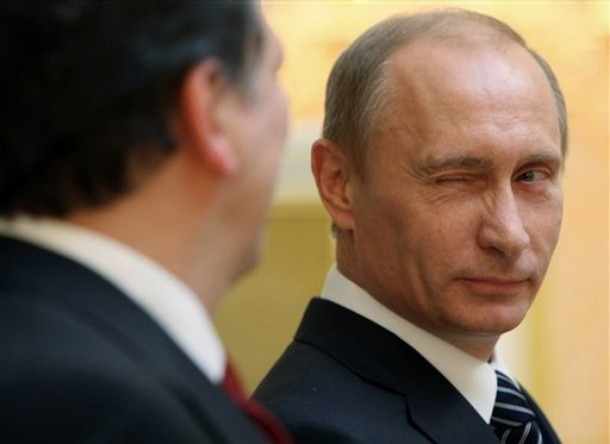As Vladimir Putin is set to return to the presidency after Russian elections March 4, the US and Europe must rethink the “reset” policy that has guided their approach to Moscow for the past several years.
Russia is experiencing the most dynamic period of political activity it has seen since the time of Boris Yeltsin. This is despite restrictions on political and press freedoms, mounting pressure on civil society, and massive corruption – or indeed, because of these very things.
Hundreds of thousands of demonstrators have participated in protests across the country – not just in Moscow and St. Petersburg. Social media have become a vital means of open communication.
And what people are communicating is that Mr. Putin’s “United Russia” party is the party of “crooks and thieves,” and that his scheme to reinstall himself as president is fundamentally illegitimate.
Putin’s own statement – that he and outgoing President Dmitry Medvedev had agreed years ago that Putin would return as president – meant that everyone who believed that Mr. Medvedev truly represented a different path for Russia, or that Russia still could be counted as some kind of democracy, had been played for a fool.
For the past several years, US and European policy has aimed largely at cooperating with the Russian government on key issues, while modulating criticism of the Kremlin’s political and human rights restrictions, and its heavy-handed pressure on neighboring countries.
This fact, however, has not stopped Putin, either as prime minister or as candidate for his old job, from turning up the anti-Western rhetoric and positioning his government as standing up to the West.
Actions include selling arms to Syria while blocking UN action, undercutting international sanctions on Iran, blocking NATO-Russia cooperation on missile defense, threatening new missile deployments aimed at Europe, and suggesting Russia could walk away from the START II Treaty on nuclear arms signed by President Obama and Medvedev.
Putin has even accused US Secretary of State Hillary Rodham Clinton of encouraging and funding the domestic protests in Russia.
This new Russian hard line is bad on its own merits – and even worse when one sees it as presaging future policy under a re-elected President Putin.
And this is the problem facing US policymakers today. Based on the far and near past, we know what Russia will be getting in a new Putin presidency. He will crack down on those who protested against him, and pursue with vigor a newly aggressive line toward his neighbors and the West.
The reset policy – which aimed at encouraging better Russian behavior by emphasizing areas of cooperation rather than difference – will have been tossed aside by Russia.
If the West were to persist with the reset, it would mean de-emphasizing criticism of Putinism, while Putin himself escalates attacks on domestic opponents and the West, and thwarts a responsible international security agenda.
In the chance that Putin at least emerges substantially weakened due to unprecedented domestic opposition, the West will face a different problem.
Because of the West’s deliberate embrace of the Kremlin, Russians pushing for a less corrupt and more democratic country will see the United States and Europe as having failed to stand up for the rights of ordinary Russians, while accommodating Putin and his regime. They will see the West as having sought to protect its own interests at the expense of the Russian people.
Whoever succeeds Putin to power in those circumstances – whether it be a reformer or a heavy-handed nationalist – will hardly look to the West as an inspiration or a friend.
Thus, in either scenario, the reset policy of the US and Europe is increasingly out of synch. The policy was premised on working together with the Russian government where possible. While never giving up on supporting democracy and Russia’s neighbors in principle, the point was not to allow such support to interrupt the prospect of building a constructive relationship with the Russian government.
Already, Putin has made clear that such a constructive relationship will not be possible.
It is of course conceivable that a re-elected Putin will morph into a reformer. But I wouldn’t count on it – and the West should be prepared to act determinedly upon the first signs that the old Putin is back.
With such a reality, the US and Europe should change course – still seeking to cooperate where possible, but taking a strong public stand against political corruption in Moscow, and in support of the legitimate aims of the Russian people, as expressed through a genuine democratic process. For example: Should Putin really be invited to a NATO-Russia Summit in Chicago in May? Or have a bilateral meeting with Mr. Obama?
Even if Putin does settle in for another dozen years, the Russian people need to know that democracies are on their side, and Putin himself needs to know that there are consequences if he persists in his old ways.
Kurt Volker, a former US ambassador to NATO, is a professor of practice at Arizona State University and a senior fellow at the Center for Transatlantic Relations and the Atlantic Council. Versions of this article appeared in Handelsblatt, La Stampa, and The Christian Science Monitor.
Image: putin-wink-photo.jpg
